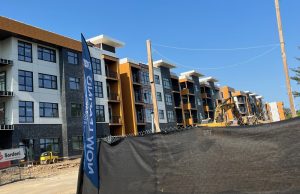 Princeton is changing and a lot of people are talking about it. Like it or not, older homes are coming down to make way for new ones and empty or underutilized lots are being cleared, where apartment buildings and other housing are being built. New construction is happening all over town, and we’re here to help you understand where and why it is happening.
Princeton is changing and a lot of people are talking about it. Like it or not, older homes are coming down to make way for new ones and empty or underutilized lots are being cleared, where apartment buildings and other housing are being built. New construction is happening all over town, and we’re here to help you understand where and why it is happening.
LARGE COMPLEXES APPROVED AND BUILT
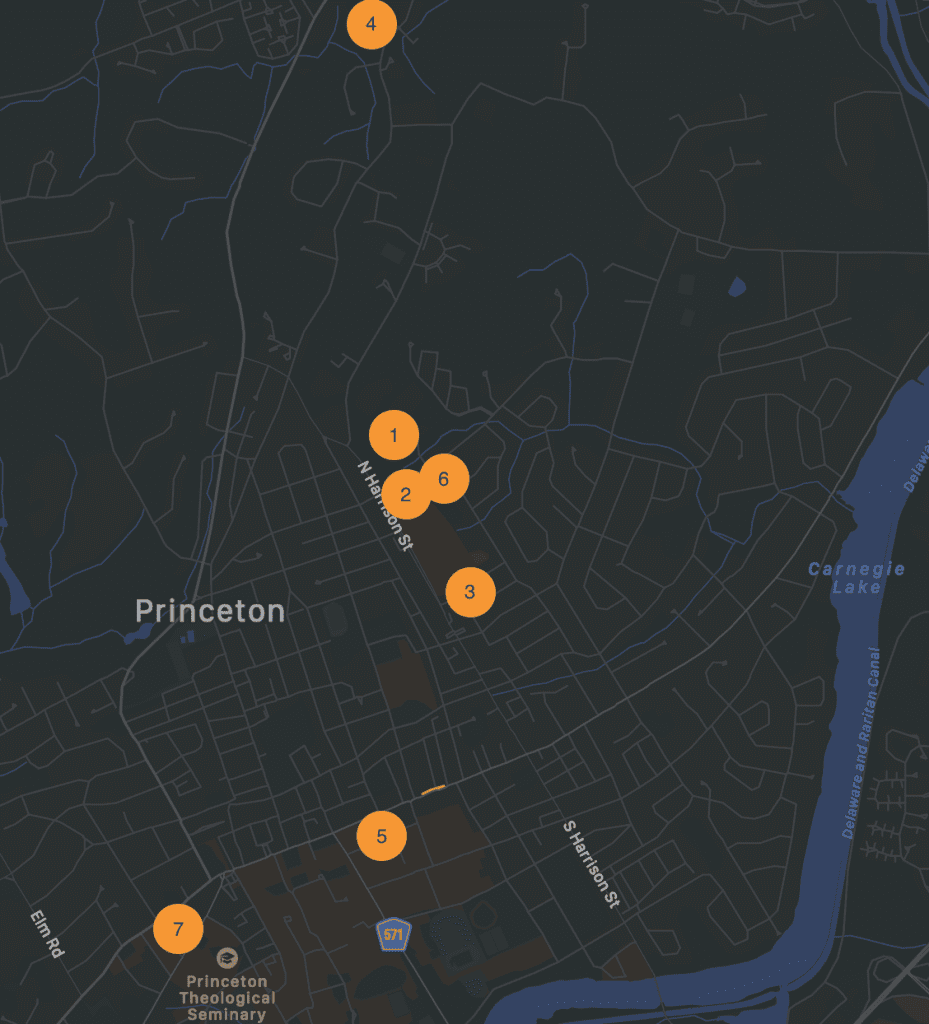 Just within the past year, Princeton has watched several new apartment complexes go up (some market-rate, some affordable housing). The largest new area is Avalon Princeton Circle, formerly known as the Thanet Property on Thanet Circle, which has 221 units all ready and available to rent (1). This sits adjacent to the Princeton Senior Living built to offer 80 new senior residences. The Alice, built at the north end of Princeton Shopping Center will have 125 units (2). It has opened opportunities for leasing, but residents are not yet able to move in. And at the other end of the shopping center, Avalon Princeton on Harrison is still being built. This site will offer 200 units (3). Also under construction are two other sites; 64 affordable units are being built on Herrontown Road at the former SAVE site (4) while a mixed-use development behind the current building at 195 Nassau Street is underway to offer 45 units (5). In addition to these completed or mid-construction, 24 market-rate townhomes and 6 affordable units were recently approved to be built at 375 Terhune Road (6). And there is one more site, where construction likely won’t even begin until late 2025, but whose redevelopment plan was formally approved this summer. The former Princeton Theological Seminary (PTS) campus at Stockton Street is expected to bring Princeton up to 238 more residential units (7).
Just within the past year, Princeton has watched several new apartment complexes go up (some market-rate, some affordable housing). The largest new area is Avalon Princeton Circle, formerly known as the Thanet Property on Thanet Circle, which has 221 units all ready and available to rent (1). This sits adjacent to the Princeton Senior Living built to offer 80 new senior residences. The Alice, built at the north end of Princeton Shopping Center will have 125 units (2). It has opened opportunities for leasing, but residents are not yet able to move in. And at the other end of the shopping center, Avalon Princeton on Harrison is still being built. This site will offer 200 units (3). Also under construction are two other sites; 64 affordable units are being built on Herrontown Road at the former SAVE site (4) while a mixed-use development behind the current building at 195 Nassau Street is underway to offer 45 units (5). In addition to these completed or mid-construction, 24 market-rate townhomes and 6 affordable units were recently approved to be built at 375 Terhune Road (6). And there is one more site, where construction likely won’t even begin until late 2025, but whose redevelopment plan was formally approved this summer. The former Princeton Theological Seminary (PTS) campus at Stockton Street is expected to bring Princeton up to 238 more residential units (7).
“People look at Princeton and say there’s a lot of units coming up. Yes, 1,000 units, but that’s because there’s been limited units built in the last 50 years,” notes longtime Princeton resident, Jamie Herring.
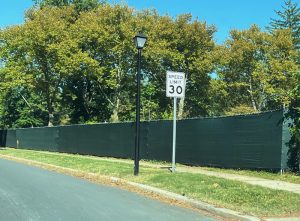 Herring is owner of Nassau Street Properties, which started buying apartments in Princeton’s smaller buildings in the 1990’s, renovating them and creating more appealing options for young professionals in the downtown area. He now owns about 50 units but has long felt that more quality market apartments are not only desired but needed. He is also owner of Herring Properties which aims to fill this void. It bought and will be redeveloping the former Seminary site (now draped in green fences), the first large apartment project on the western side of town since senior housing was built on Great Road in the 1980s. Even though it can feel like a lot at once, he says his new development is an additional part of the smart growth trend, enticing people into more central, walkable areas.
Herring is owner of Nassau Street Properties, which started buying apartments in Princeton’s smaller buildings in the 1990’s, renovating them and creating more appealing options for young professionals in the downtown area. He now owns about 50 units but has long felt that more quality market apartments are not only desired but needed. He is also owner of Herring Properties which aims to fill this void. It bought and will be redeveloping the former Seminary site (now draped in green fences), the first large apartment project on the western side of town since senior housing was built on Great Road in the 1980s. Even though it can feel like a lot at once, he says his new development is an additional part of the smart growth trend, enticing people into more central, walkable areas.
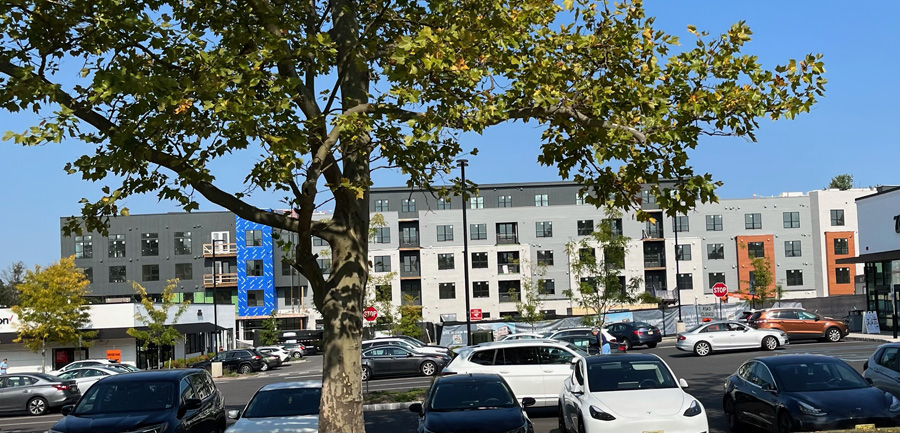 “There is a requirement to get a certain number of affordable units and we’re at the tail end of that requirement. That’s why you’re seeing this surge of Thanet, the shopping center, including The Alice. That’s basically 10-years of affordable requirements packed into a couple of years,” Herring explains. “People are demanding, they’re living and working from their homes 2-3 days a week or more. No longer do they need just a 2-bedroom, they also need a den for when they’re working. All my older units don’t have that. Or they’re now getting a 2-bedroom for just one person, but those are old and obsolete things. You adapt around it, but the better thing is to have newer construction that meets the changing environment.”
“There is a requirement to get a certain number of affordable units and we’re at the tail end of that requirement. That’s why you’re seeing this surge of Thanet, the shopping center, including The Alice. That’s basically 10-years of affordable requirements packed into a couple of years,” Herring explains. “People are demanding, they’re living and working from their homes 2-3 days a week or more. No longer do they need just a 2-bedroom, they also need a den for when they’re working. All my older units don’t have that. Or they’re now getting a 2-bedroom for just one person, but those are old and obsolete things. You adapt around it, but the better thing is to have newer construction that meets the changing environment.”
As Herring alludes to, the push for Princeton to welcome in the latest multi-unit complexes is in part a desire to have abundant market-rate, modern opportunities for retirees, seniors, and young families or professionals fitting in with the desired future Master Plan. But it has also been a way to get affordable housing units built and interspersed within market-rate ones. It’s a more recent trend which not only meets the municipal commitment, but it puts the financial burden onto builders instead of the town and enables people of different income levels to all live nearby each other. Approvals for these developments are not always easy, though. Lawsuits and/or contentious council and planning meetings have occurred for nearly every project mentioned above.
SINGLE FAMILY HOME CONSTRUCTION
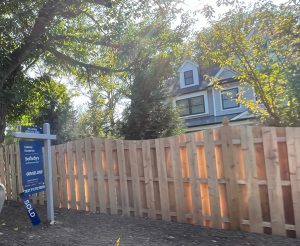 Part of the changing environment one sees around Princeton is also in the single-family housing market. Though some desire the flexibility of the rental apartment or townhome, others want to build equity and plant their roots. Properties known as “teardowns” refer to lots where a buyer purchases with the intent of removing the existing home and rebuilding. In today’s market, despite high interest rates and home prices, teardowns don’t last long once listed and often sell above asking price. They are sometimes purchased by an owner who will then hire a builder or often by the builders themselves who will either try to sell the property to a new owner on spec (speculative house) before it’s built or put it to market once completed.
Part of the changing environment one sees around Princeton is also in the single-family housing market. Though some desire the flexibility of the rental apartment or townhome, others want to build equity and plant their roots. Properties known as “teardowns” refer to lots where a buyer purchases with the intent of removing the existing home and rebuilding. In today’s market, despite high interest rates and home prices, teardowns don’t last long once listed and often sell above asking price. They are sometimes purchased by an owner who will then hire a builder or often by the builders themselves who will either try to sell the property to a new owner on spec (speculative house) before it’s built or put it to market once completed.
“Somebody who would tear it down usually has a bigger budget and they’re looking for something very specific, they want to put their stamp on their own individual home. More people just want move-in ready homes, I see a real need for that,” states Stephanie Will, Realtor at Caldwell Banker Princeton. “People are younger, usually with kids going to school, and they don’t always have the stamina to do a project like that. With the average sale price in Princeton now about $1.5m, they don’t want to start to have to do work.”
According to the multiple listing service (MLS), eight new construction homes have sold so far this year. It is likely there are even more new houses built than the MLS includes, as some houses are torn down after a sale is completed or homes are reconstructed on a lot that a homeowner has already lived on and owned.
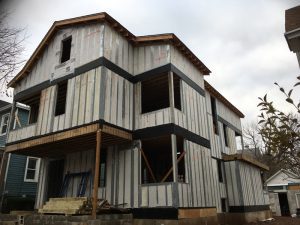 “There’s a strong demand for single-family homes, especially those close to downtown Princeton. Clients are looking for homes that balance space, privacy, and functionality—particularly with the shift towards remote work and spending more time at home,” details Princeton builder, Michael Rotenberg, owner of Accel Building Company. “There’s also growing demand for energy-efficient and sustainable building practices. Homeowners are becoming more environmentally conscious and are seeking homes that reflect that mindset. We’re getting requests for homes framed with ThermaSteel panels, which not only offer exceptional insulation but are also manufactured in a zero-waste facility.”
“There’s a strong demand for single-family homes, especially those close to downtown Princeton. Clients are looking for homes that balance space, privacy, and functionality—particularly with the shift towards remote work and spending more time at home,” details Princeton builder, Michael Rotenberg, owner of Accel Building Company. “There’s also growing demand for energy-efficient and sustainable building practices. Homeowners are becoming more environmentally conscious and are seeking homes that reflect that mindset. We’re getting requests for homes framed with ThermaSteel panels, which not only offer exceptional insulation but are also manufactured in a zero-waste facility.”
In a high-priced housing market like Princeton, it can be a big decision to build your own home. With few open spaces around, if location is your priority, many are choosing the lot that’s located where they want to live, then building the house to match their needs. New construction may cost more upfront, but sometimes the longer-term benefits make it a better choice. For example, the energy-efficient practices Rotenberg mentioned are not only ways to prevent climate change but often ways to save money. Whether you choose to install multi-pane windows, use Energy Star appliances or build using materials such as ThermaSteel panels, it can save trees as well as result in lower energy costs, less maintenance and fewer repairs.
There’s also the reality that if you want to make substantial changes to an existing home, sometimes starting new can cost less and create fewer headaches.
“Renovations typically involve working with existing conditions that can lead to unforeseen issues, such as outdated wiring, structural deficiencies, or old insulation that no longer meets current code requirements. These hidden expenses can quickly add up and make budgeting unpredictable. In contrast, new construction provides a clean slate, avoiding these potential extra costs and allowing for a more predictable budget,” says Rotenberg.
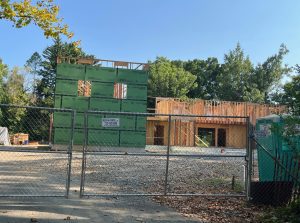 When it comes to the new construction market, the average price for such homes active on MLS today is $2.5 million. Of new construction homes already sold, the average sale prices is $2.9 million. For those seeking to downsize, or who prefer the flexibility of a rental, today’s new rental developments offer studios at Avalon Princeton Circle starting at $2,855, with one-bedrooms beginning at $3,203. One-bedroom leases are available from $2,799 at The Alice.
When it comes to the new construction market, the average price for such homes active on MLS today is $2.5 million. Of new construction homes already sold, the average sale prices is $2.9 million. For those seeking to downsize, or who prefer the flexibility of a rental, today’s new rental developments offer studios at Avalon Princeton Circle starting at $2,855, with one-bedrooms beginning at $3,203. One-bedroom leases are available from $2,799 at The Alice.
WHAT IS TO BE BUILT NEXT?
More new construction will continue to be approved and take place. How and when is controlled by Princeton’s zoning ordinances, and possible updates to them provided by the visions in Princeton’s new Master Plan approved late last year. For example, Herring’s seminary project was enabled due to a 2018 designation of that property as an ‘area in need of redevelopment.’ Though it does anticipate some further changes to existing zoning and planning regulations, the municipal planning department confirms it is not true that Princeton will start allowing subdivisions of up to four home per lot. It does, however, recommend opportunities to convert single-family homes into multi-family. This will create more housing on the available lots.
“Zoning changes have not been made to allow for either of those things to date. I expect we will harmonize the zoning codes of the former Borough and Township, followed by analyzing and creating formal studies of things like Missing Middle Housing or a “diagnostic” of our zoning code prior to studying and implementing what changes could be made to our zoning code for the topics recommended in the master plan,” explains Princeton Planning Director Justin Lesko.
Which changes will come to fruition, only time will tell. Certainly, there are many Princetonians who feel the town is getting too crowded and the changes are not wise. But if you get a chance to talk to the newcomers, those downsizing or those that are supportive of smart growth trends, they are excited to be part of the Princeton community and feel things are happening just as they should be.
(This story has been corrected to change the location of 195 Witherspoon to 195 Nassau in paragraph 1)

Lisa Jacknow spent years working in national and local news in and around New York City before moving to Princeton. Working as both a TV producer and news reporter, Lisa came to this area to focus on the local news of Mercer County at WZBN-TV. In recent years, she got immersed in the Princeton community by serving leadership roles at local schools in addition to volunteering for other local non-profits. In her free time, Lisa loves to spend time with her family, play tennis, sing and play the piano. A graduate of the S. I. Newhouse School of Public Communications at Syracuse University, Lisa was raised just north of Boston, Massachusetts but has lived in the tri-state area since college. She is excited to be Editor and head writer for Princeton Perspectives!

 Perhaps you just moved into a brand-new house, or maybe you’ve been in your house for decades. Due to today’s high home prices and steep interest rates, it is even possible you’ve decided to stay in your home a bit longer than planned. Whatever your situation, there are ways to protect your home and what is in it, helping to ensure not only that things are in good and working order but to curb any unexpected expenses and surprises.
Perhaps you just moved into a brand-new house, or maybe you’ve been in your house for decades. Due to today’s high home prices and steep interest rates, it is even possible you’ve decided to stay in your home a bit longer than planned. Whatever your situation, there are ways to protect your home and what is in it, helping to ensure not only that things are in good and working order but to curb any unexpected expenses and surprises.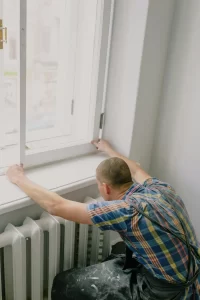 If you’ve recently had your home built, it is important to know your builder is required, by law, to offer a limited 10-year warranty. This warranty is specifically to protect against any defective materials or devices that may have been used when building your home. Builders have the option to utilize one of six state-approved private plans, otherwise they are automatically enrolled in the
If you’ve recently had your home built, it is important to know your builder is required, by law, to offer a limited 10-year warranty. This warranty is specifically to protect against any defective materials or devices that may have been used when building your home. Builders have the option to utilize one of six state-approved private plans, otherwise they are automatically enrolled in the 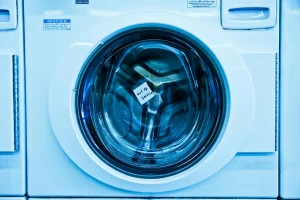 Companies such as
Companies such as 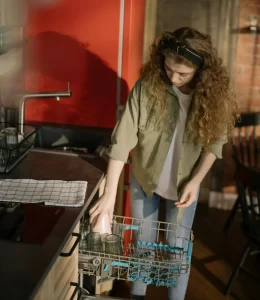 Each plan is specific to certain items. For example, the heating coverage options include gas furnace/state boiler, standard water heater, exposed indoor gas piping, ductless heating & cooling, exposed indoor gas piping and standard heat pump whereas the cooling plans cover your central A/C and offer add-ons to include ductless heating & cooling and standard heat pump as well. If you opt for a kitchen plan, those cover your dishwasher, stovetop, refrigerator, freezer and oven, but your washer and dryer coverage would be through a laundry plan.
Each plan is specific to certain items. For example, the heating coverage options include gas furnace/state boiler, standard water heater, exposed indoor gas piping, ductless heating & cooling, exposed indoor gas piping and standard heat pump whereas the cooling plans cover your central A/C and offer add-ons to include ductless heating & cooling and standard heat pump as well. If you opt for a kitchen plan, those cover your dishwasher, stovetop, refrigerator, freezer and oven, but your washer and dryer coverage would be through a laundry plan. Whether or not you are protecting your electrical systems and appliances, you could save money by running them with a different type of energy and at the same time, increase the value of your home. You will need to do the math to make a guesstimate on whether you will be in your home long enough to see the return on your investment, but going solar, especially in New Jersey, can have its benefits. The Garden State has a goal of having 4.1% of its electricity sales coming from solar by 2028. To get there, they have created incentives for homeowners to encourage more to install it.
Whether or not you are protecting your electrical systems and appliances, you could save money by running them with a different type of energy and at the same time, increase the value of your home. You will need to do the math to make a guesstimate on whether you will be in your home long enough to see the return on your investment, but going solar, especially in New Jersey, can have its benefits. The Garden State has a goal of having 4.1% of its electricity sales coming from solar by 2028. To get there, they have created incentives for homeowners to encourage more to install it. To keep your home well-kept does require effort and sometimes, money. Just like the human body, regular check-ups can help to ensure that things are well cleaned, and necessary updates are made. Doing so could prevent your need for service or repairs. Heating, ventilation and air conditioning companies (HVAC), for example, offer annual or bi-annual maintenance packages that help you to do this. You could also invest in dryer duct cleaning and home air duct cleaning, to help ensure there are no back-ups and things are venting and passing through properly. Just be careful, there are also frauds that advertise these services.
To keep your home well-kept does require effort and sometimes, money. Just like the human body, regular check-ups can help to ensure that things are well cleaned, and necessary updates are made. Doing so could prevent your need for service or repairs. Heating, ventilation and air conditioning companies (HVAC), for example, offer annual or bi-annual maintenance packages that help you to do this. You could also invest in dryer duct cleaning and home air duct cleaning, to help ensure there are no back-ups and things are venting and passing through properly. Just be careful, there are also frauds that advertise these services. Trying to take advantage of the final weeks of summer? Ready for fall to begin? As summer winds down and many prepare to return to school and busier lives, Princeton Perspectives brings you a closer look with
Trying to take advantage of the final weeks of summer? Ready for fall to begin? As summer winds down and many prepare to return to school and busier lives, Princeton Perspectives brings you a closer look with 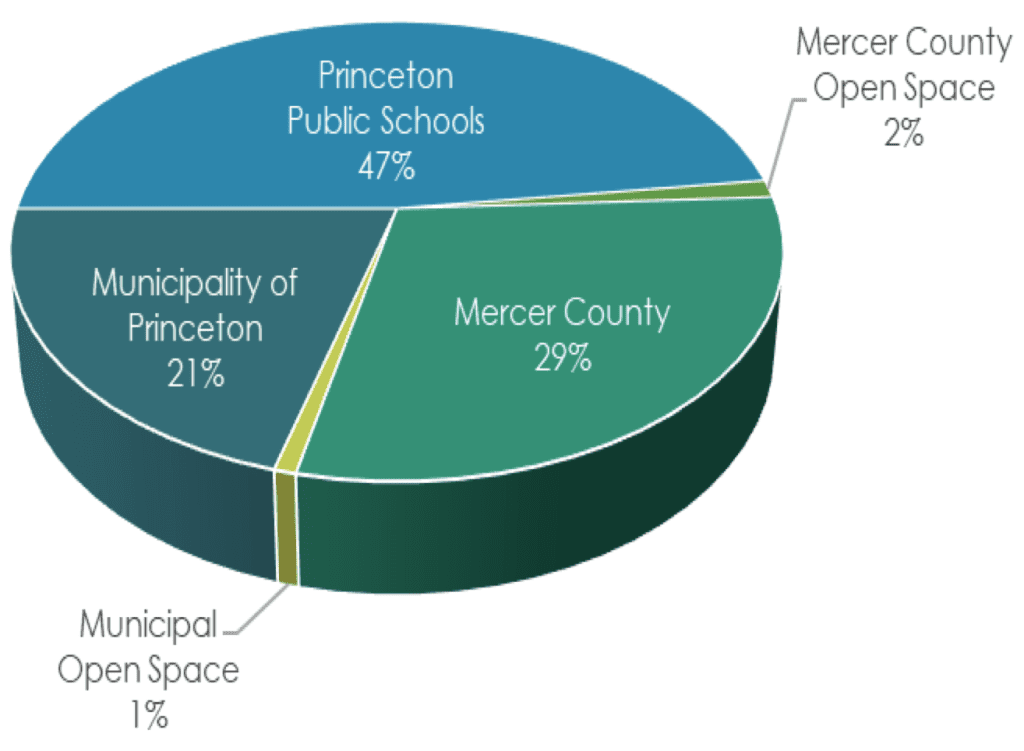
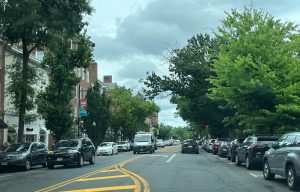 To understand how municipal tax bills are formulated, it is important to first understand who is paying taxes. Princeton is home to numerous schools, charitable organizations, cemeteries and there is a lot of property in the area owned by the town or state. Those, in addition to disabled veterans, senior and affordable housing and other exempt entities, bring a lot of important value to Princeton – but they do not bring in tax money. While there are some payments in lieu of taxes given to the municipal coffers, the exemption of 882 entities means the tax burden is split amongst the 7,991 properties that make up the tax base.
To understand how municipal tax bills are formulated, it is important to first understand who is paying taxes. Princeton is home to numerous schools, charitable organizations, cemeteries and there is a lot of property in the area owned by the town or state. Those, in addition to disabled veterans, senior and affordable housing and other exempt entities, bring a lot of important value to Princeton – but they do not bring in tax money. While there are some payments in lieu of taxes given to the municipal coffers, the exemption of 882 entities means the tax burden is split amongst the 7,991 properties that make up the tax base. The 2024 municipal budget is $74,514,097, and only 54% of that comes from taxes. As the Budget Newsletter details, there is other revenue from “parking and traffic enforcement fees, sewer fees, and fire and housing inspection fees.” Additional monies come from reserves, state aid, grants and payments in lieu of taxes (including Princeton University’s contribution), as well as from some of the nonprofit and other entities mentioned above. Princeton is currently sitting on a surplus that has increased $3.5 million, so why isn’t more of that used to keep taxes lower?
The 2024 municipal budget is $74,514,097, and only 54% of that comes from taxes. As the Budget Newsletter details, there is other revenue from “parking and traffic enforcement fees, sewer fees, and fire and housing inspection fees.” Additional monies come from reserves, state aid, grants and payments in lieu of taxes (including Princeton University’s contribution), as well as from some of the nonprofit and other entities mentioned above. Princeton is currently sitting on a surplus that has increased $3.5 million, so why isn’t more of that used to keep taxes lower?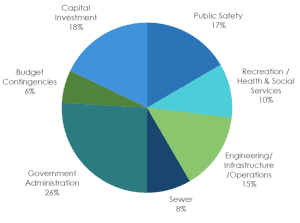
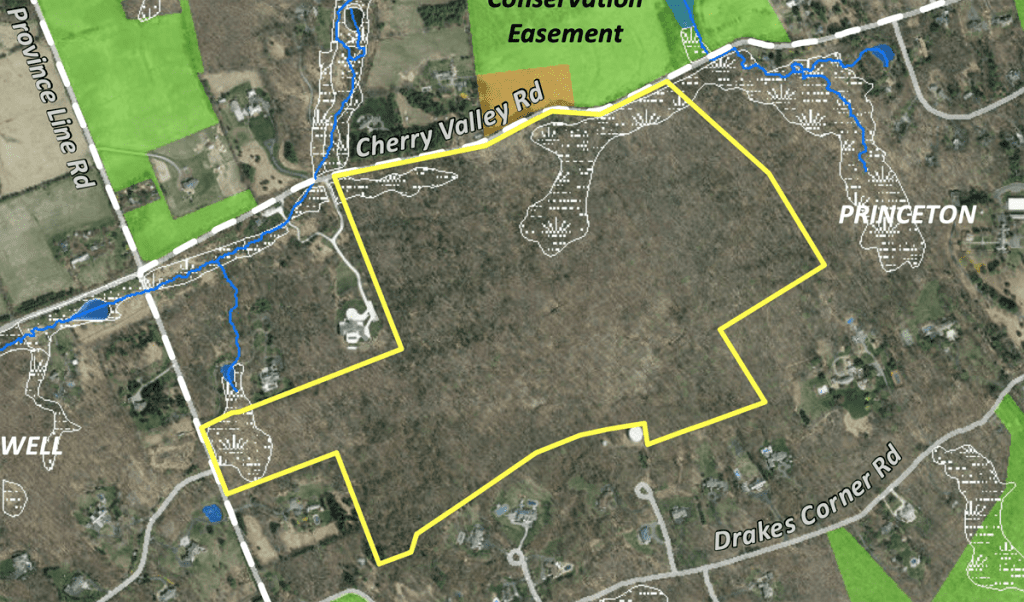
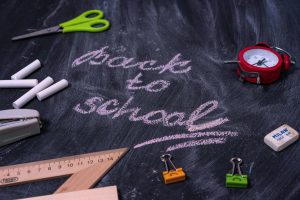 Summertime is when families enjoy a break, relax, maybe get away. It’s often a slower time of year, where students can give their brains a rest and even enjoy time at summer camp, with friends and loved ones. Conversely, in the weeks between late June and early September, school administrators find little time for relaxation as they work to review the past year, make changes for the upcoming year and get major construction and enhancement projects completed before Labor Day hits and the new influx of students arrive.
Summertime is when families enjoy a break, relax, maybe get away. It’s often a slower time of year, where students can give their brains a rest and even enjoy time at summer camp, with friends and loved ones. Conversely, in the weeks between late June and early September, school administrators find little time for relaxation as they work to review the past year, make changes for the upcoming year and get major construction and enhancement projects completed before Labor Day hits and the new influx of students arrive.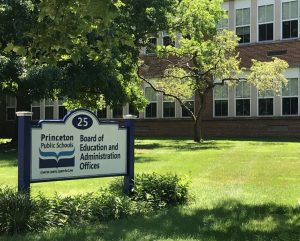 Princeton Public Schools likely had a longer “to-do” list than others, as it encompasses six schools and their buildings (plus the administrative building on Valley Road). With predicted enrollment for 2024-2025 at 3,651, it is the largest school entity in town. The district had to not only do the usual annual upkeep and adjustments but also complete a list of items remaining from the previous referendum (before a new referendum is expected to go to voters in January 2025).
Princeton Public Schools likely had a longer “to-do” list than others, as it encompasses six schools and their buildings (plus the administrative building on Valley Road). With predicted enrollment for 2024-2025 at 3,651, it is the largest school entity in town. The district had to not only do the usual annual upkeep and adjustments but also complete a list of items remaining from the previous referendum (before a new referendum is expected to go to voters in January 2025).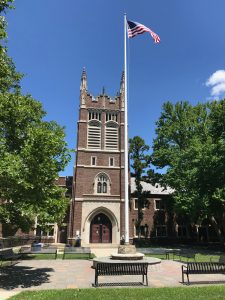 The major construction projects of summer are currently underway at Princeton High School, where new security vestibules are being built at both the Tower and PAC (Performing Arts Center) entrances. Simultaneously, crews are making upgrades to the high school cafeteria, which include redesigned food stations, new furniture, better acoustics and, by creating more usable square footage, hoping to offer more seating options as well. These are anticipated to be completed just before school opens for the fall.
The major construction projects of summer are currently underway at Princeton High School, where new security vestibules are being built at both the Tower and PAC (Performing Arts Center) entrances. Simultaneously, crews are making upgrades to the high school cafeteria, which include redesigned food stations, new furniture, better acoustics and, by creating more usable square footage, hoping to offer more seating options as well. These are anticipated to be completed just before school opens for the fall.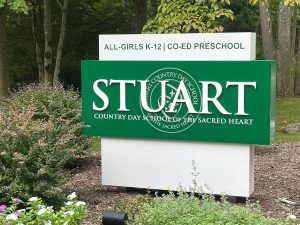
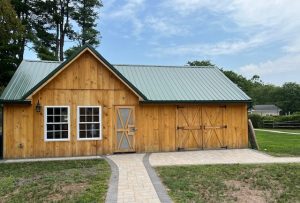 About five miles away, there is a brand-new STEM lab opening at
About five miles away, there is a brand-new STEM lab opening at 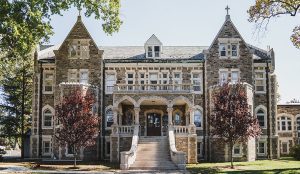
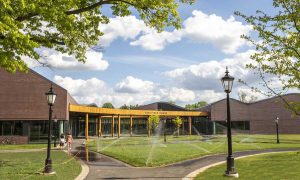 Athletic improvements can also be found at
Athletic improvements can also be found at 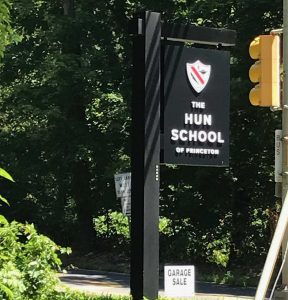 If you drive up State Highway 206 and turn onto Edgerstoune Road, you will notice that a building has come down on
If you drive up State Highway 206 and turn onto Edgerstoune Road, you will notice that a building has come down on 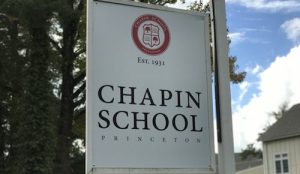 There is new leadership at
There is new leadership at 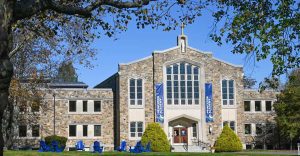 Not too far away, new talent is also in place at
Not too far away, new talent is also in place at 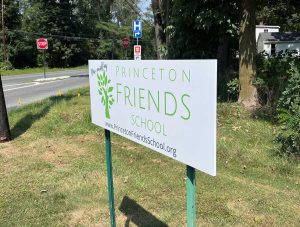 At
At 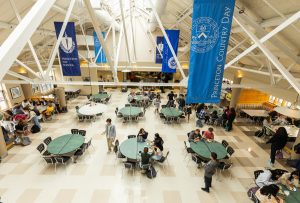 With a Presidential election on the horizon,
With a Presidential election on the horizon, 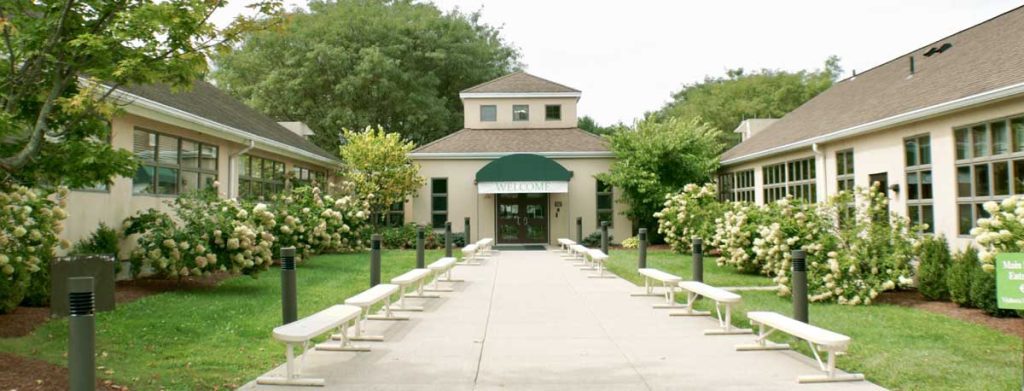 Another way to help its children become fully functioning members of society,
Another way to help its children become fully functioning members of society,  It is summer, peak wedding season. As we attend, plan for or recall our own weddings, there is one common saying that comes to mind. It is from an old English rhyme, meant to provide for a future of happiness. As many begin their futures together this summer, we also look forward to a happy future for everyone around Princeton. So, we chose to incorporate this saying into the July issue of Princeton Perspectives,
It is summer, peak wedding season. As we attend, plan for or recall our own weddings, there is one common saying that comes to mind. It is from an old English rhyme, meant to provide for a future of happiness. As many begin their futures together this summer, we also look forward to a happy future for everyone around Princeton. So, we chose to incorporate this saying into the July issue of Princeton Perspectives, 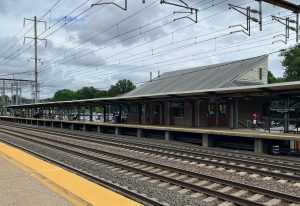 Sometimes old things demonstrate their strength and virility and other times, they show their weakness and frailty. Today’s old Northeast Corridor train line, which is America’s busiest line and runs in full 457 miles from Washington D.C. to Boston, was constructed between 1830 and 1917. Though the strength of its tracks enable it to still operate, it is very much showing its age – at least on the stretch between New Jersey and New York.
Sometimes old things demonstrate their strength and virility and other times, they show their weakness and frailty. Today’s old Northeast Corridor train line, which is America’s busiest line and runs in full 457 miles from Washington D.C. to Boston, was constructed between 1830 and 1917. Though the strength of its tracks enable it to still operate, it is very much showing its age – at least on the stretch between New Jersey and New York.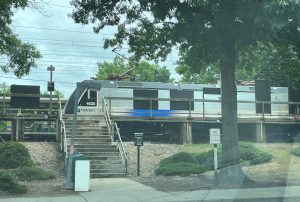 Something is not working right within the infrastructure owned by
Something is not working right within the infrastructure owned by 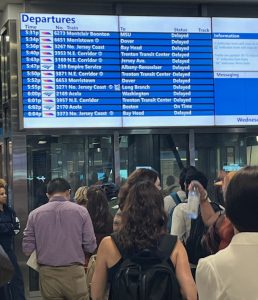 “We went through a period of 12 consecutive commutes with issues. Not just a small delay on the train but massive shutdowns where you have no idea if you’re getting home (or to work),” shares one local commuter, who has been commuting nearly daily since 2003. “A few years ago, NJT had what we recall as the ‘summer of hell’, but the difference there was a lot of the issues were planned work. Knowing an issue is coming, you can make alternate arrangements. This year these issues are unexpected; in many cases they start literally when you’re on your way to Penn Station.”
“We went through a period of 12 consecutive commutes with issues. Not just a small delay on the train but massive shutdowns where you have no idea if you’re getting home (or to work),” shares one local commuter, who has been commuting nearly daily since 2003. “A few years ago, NJT had what we recall as the ‘summer of hell’, but the difference there was a lot of the issues were planned work. Knowing an issue is coming, you can make alternate arrangements. This year these issues are unexpected; in many cases they start literally when you’re on your way to Penn Station.”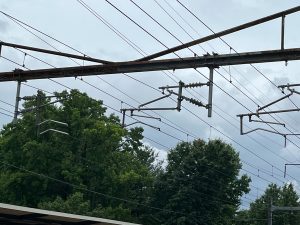 According to their statement, immediate actions being taken to try and resolve the issues include more frequent inspections of the tracks and overhead wiring structures between Trenton and New York City, installation of cameras to visually inspect the power connections, expanding inspections of overhead wire components through helicopter photography and a review of all of the issues with internal and external partners.
According to their statement, immediate actions being taken to try and resolve the issues include more frequent inspections of the tracks and overhead wiring structures between Trenton and New York City, installation of cameras to visually inspect the power connections, expanding inspections of overhead wire components through helicopter photography and a review of all of the issues with internal and external partners.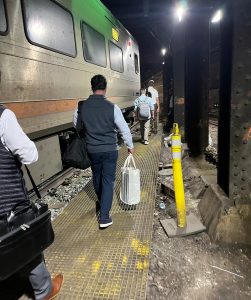 The customers, many of whom reside in this area, want more than just an investigation. How do they explain when the train “dies” just outside of NY Penn Station and commuters have to get out and walk the tracks to get into the station? As of last year, Princeton Junction Station was the 6th most populated station in terms of ridership, servicing more than 86,000 people. Princeton resident, Rob Ehee, is one of them. He has been community from there into NYC for 19 years, 3-4 times per week and says whether the problem lays with Amtrak or NJT, it is time to own up and fix it.
The customers, many of whom reside in this area, want more than just an investigation. How do they explain when the train “dies” just outside of NY Penn Station and commuters have to get out and walk the tracks to get into the station? As of last year, Princeton Junction Station was the 6th most populated station in terms of ridership, servicing more than 86,000 people. Princeton resident, Rob Ehee, is one of them. He has been community from there into NYC for 19 years, 3-4 times per week and says whether the problem lays with Amtrak or NJT, it is time to own up and fix it. When problems are too disruptive, NJT cross honors tickets between its train and bus systems, hoping that will provide opportunities for commuters to get home. It also provides a link to help riders find options through
When problems are too disruptive, NJT cross honors tickets between its train and bus systems, hoping that will provide opportunities for commuters to get home. It also provides a link to help riders find options through 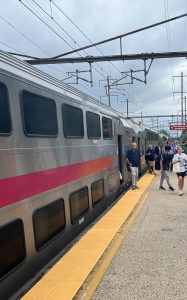 With a Fiscal Year (FY) 25 operating budget gap of $106.6 million dollars, NJT says they had to work to prepare for growth, solve current and long-term funding needs and meet future demand. Using a three-pronged approach of trying to be more efficient, the fare hike and taking advantage of Governor Murphy’s Corporate Transit Fee, included in the FY25 State budget, they hope to get on better footing.
With a Fiscal Year (FY) 25 operating budget gap of $106.6 million dollars, NJT says they had to work to prepare for growth, solve current and long-term funding needs and meet future demand. Using a three-pronged approach of trying to be more efficient, the fare hike and taking advantage of Governor Murphy’s Corporate Transit Fee, included in the FY25 State budget, they hope to get on better footing.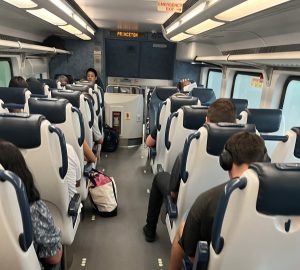 “The passengers are the ones who bear the brunt of it all. Frankly it’s inexcusable that NJT would continue to just blame Amtrak. Where is Governor Murphy through all of this? Where is all the money from the infrastructure bill? Supposed to be billions for Amtrak,” said a Princeton NJT commuter.
“The passengers are the ones who bear the brunt of it all. Frankly it’s inexcusable that NJT would continue to just blame Amtrak. Where is Governor Murphy through all of this? Where is all the money from the infrastructure bill? Supposed to be billions for Amtrak,” said a Princeton NJT commuter.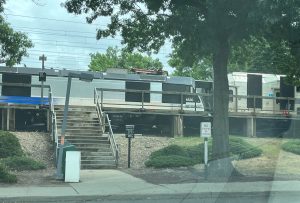 NJT also shared some additional longer-term plans to address the infrastructure which include “added resources to expedite testing of transformers in substations, pursuing additional grants to replace catenary, substations and transmission, signal lines, and to support capital renewal, as well as evaluating methods to expand overnight work windows with service adjustments to accelerate renewal and repairs.”
NJT also shared some additional longer-term plans to address the infrastructure which include “added resources to expedite testing of transformers in substations, pursuing additional grants to replace catenary, substations and transmission, signal lines, and to support capital renewal, as well as evaluating methods to expand overnight work windows with service adjustments to accelerate renewal and repairs.”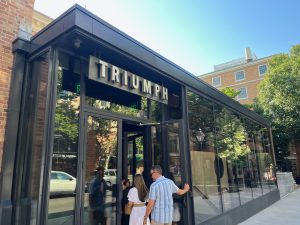 Triumph Brewery had been a well-known Princeton establishment. In fact, it was issued the very first brewpub license in the state of New Jersey when it first opened on Nassau Street in 1995. Through the years, additional locations in Red Bank and New Hope have found great success as well. But, as owner Adam Rechnitz looked to the future (and opportunity provided), he decided to relocate and take over the old post office building in downtown Princeton. His brand-new brewpub, now named
Triumph Brewery had been a well-known Princeton establishment. In fact, it was issued the very first brewpub license in the state of New Jersey when it first opened on Nassau Street in 1995. Through the years, additional locations in Red Bank and New Hope have found great success as well. But, as owner Adam Rechnitz looked to the future (and opportunity provided), he decided to relocate and take over the old post office building in downtown Princeton. His brand-new brewpub, now named 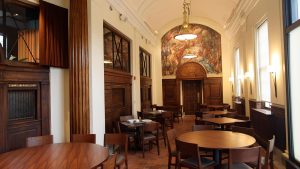
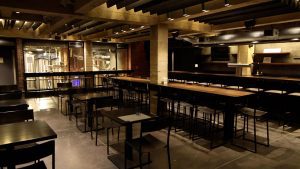
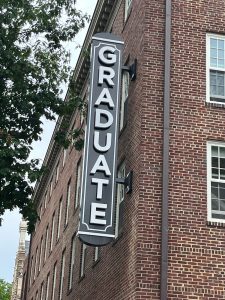 The coordination meetings that Triumph had to engage in with Princeton engineering were due in part to a new hotel being built simultaneously nearby on Nassau and Chambers Streets.
The coordination meetings that Triumph had to engage in with Princeton engineering were due in part to a new hotel being built simultaneously nearby on Nassau and Chambers Streets. 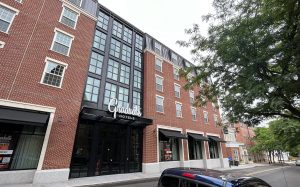 The Graduate hotel brand (found on or near over 30 college campuses across the country and UK) incorporates details from its nearby college or university into every aspect. The original structure that is housing Graduate Princeton was built by Princeton University as a student dormitory in 1918, so it provides an abundance of charm and history to pull from.
The Graduate hotel brand (found on or near over 30 college campuses across the country and UK) incorporates details from its nearby college or university into every aspect. The original structure that is housing Graduate Princeton was built by Princeton University as a student dormitory in 1918, so it provides an abundance of charm and history to pull from.
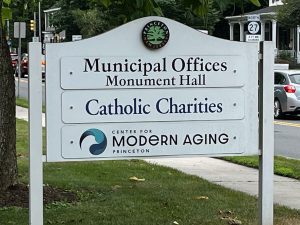 There is yet another opportunity that is rather new in Princeton but has been around elsewhere for a while – and that is
There is yet another opportunity that is rather new in Princeton but has been around elsewhere for a while – and that is 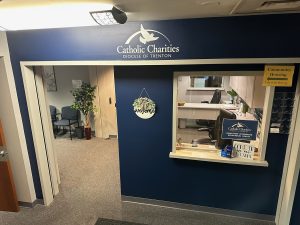 On an outpatient basis, the center offers individual therapy, medication management and offers nursing services to link individuals to primary care needs they may have. It also helps people address housing needs and food insecurity, providing case management services. Around since 1971, Catholic Charities has over 60 Behavioral Health programs working to overcome the stigma of mental health treatment and provide help. Princeton is its newest location.
On an outpatient basis, the center offers individual therapy, medication management and offers nursing services to link individuals to primary care needs they may have. It also helps people address housing needs and food insecurity, providing case management services. Around since 1971, Catholic Charities has over 60 Behavioral Health programs working to overcome the stigma of mental health treatment and provide help. Princeton is its newest location.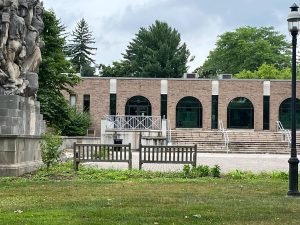 With eight people on site (including a psychiatrist, clinicians, office manager and those helping with housing and food insecurity), the center is there to help people on Mondays, Thursdays and Fridays from 9am-5pm and on Tuesdays and Wednesdays from 9am-8pm. Telehealth services are also available for those that can’t or choose not to visit in person. All those seeking help can contact the access center at 800-360-7711.
With eight people on site (including a psychiatrist, clinicians, office manager and those helping with housing and food insecurity), the center is there to help people on Mondays, Thursdays and Fridays from 9am-5pm and on Tuesdays and Wednesdays from 9am-8pm. Telehealth services are also available for those that can’t or choose not to visit in person. All those seeking help can contact the access center at 800-360-7711.